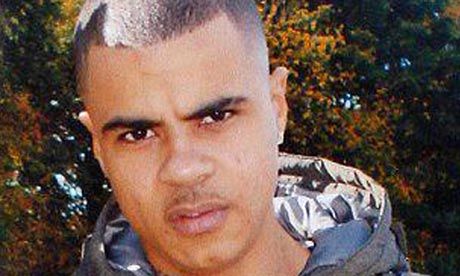Mark Duggan death: IPCC says hands are tied over release of evidence
Police watchdog investigating death of Duggan, whose shooting sparked last year's riots, says law prevents it revealing evidence
Mark Duggan, who was shot and killed in August 2011 by a Metropolitan police officer in Tottenham, north London. Photograph: Rex Features
The police watchdog investigating the death of Mark Duggan has called for the law to be changed after admitting that its "hands are tied" by legislation that means that a public coroner's inquest into the killing may never be held.
The deputy chair of the Independent Police Complaints Commission (IPCC), Deborah Glass, put out a statement on Thursday morning saying the organisation was "extremely frustrated" by the Regulation of Investigatory Powers Act 2000, which she says has stopped her organisation from revealing information unearthed during its investigation into Duggan's death.
The statement follows the revelation earlier this week that the coroner's inquest into the death has been delayed and may never be held, and that the IPCC's own investigation into the killing had also been delayed and its findings may not be available until the autumn.
Duggan was killed in August 2011 after being shot by a Metropolitan police officer in Tottenham, north London. The subsequent protest over his death sparked riots in the capital, which rapidly spread to the rest of England.
After Duggan's death, the IPCC said he had shot at police marksmen before they returned fire but it soon retracted its statement, saying it was untrue.
The IPCC's statement came as the aunt of Mark Duggan, Carole Duggan, said on Radio 4's Today programme that the family knew little more than the public as to what had led to his killing since the IPCC opened its investigation last year.
"We as a family believe that Mark was executed on the streets of London by the Metropolitan police … all the information is being withheld from us."
"I know that the IPCC have got a job to do but we see the IPCC as an obstacle in the way of getting information from the Metropolitan police," she said.
In her IPCC statement, Glass said: "The IPCC believes that it is essential for families to play a full part in any process which establishes how and in what circumstances their family member died.
"Our principal statutory duty is to secure and maintain confidence in the police complaints system and one way in which this can be achieved is by ensuring that there is proper public scrutiny when someone dies at the hands of the state.
"We are therefore extremely frustrated when anyone or anything attempts to get in the way of our ability to provide family members with information about an investigation into a death at the hands of the police or to ensure a full public examination of the facts surrounding the death."
The statement says that the impact of the Regulation of Investigatory Powers Act 2000 is "that not only can some information not be disclosed, we cannot even explain why we cannot disclose the information, as this itself would be a breach of the law.
By law certain types of surveillance including phone intercepts cannot be produced in a public court.
In a letter published in the Guardian on Thursday, Rachel Cerfontyne, an IPCC commissioner, said the watchdog did not want a secret court hearing and had alerted Duggan's coroner to the problems surrounding the secret information they had uncovered.
"The IPCC is not seeking to withhold information, but has alerted the coroner that there may be relevant material that we will be legally prevented from disclosing to him or the interested parties."We have drawn this to the coroner's attention at this stage because we considered it to be fair and right to give him and the family early warning of these potential difficulties."
The coroner decided the issues would not be discussed until October following a criminal trial relating to the case.
Cerfontyne said the IPCC wanted a public hearing and had raised the same problem to a House of Commons committee three years ago.
In its submission to the joint committee for human rights, the IPCC raised the issue of whether the information on certain types of surveillance, which by law cannot be heard in public, could be shared with the family by the inquest.
It said families would not otherwise be given the full picture of the events leading to the death of a loved one.
"It is because the IPCC believes that information should be disclosed to the deceased's family and the public that, in March 2009, we made a submission to the joint committee for human rights on the proposals in the coroners and justice bill on non-jury inquests," she wrote.
http://www.guardian.co.uk/politics/2012/mar/29/mark-duggan-death-ipcc-hands-tied-evidence?CMP=twt_fd

